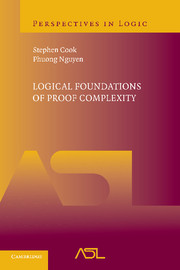Book contents
- Frontmatter
- Contents
- PREFACE
- CHAPTER I INTRODUCTION
- CHAPTER II THE PREDICATE CALCULUS AND THE SYSTEM LK
- CHAPTER III PEANO ARITHMETIC AND ITS SUBSYSTEMS
- CHAPTER IV TWO-SORTED LOGIC AND COMPLEXITY CLASSES
- CHAPTER V THE THEORY V0 AND AC0
- CHAPTER VI THE THEORY V1 AND POLYNOMIAL TIME
- CHAPTER VII PROPOSITIONAL TRANSLATIONS
- CHAPTER VIII THEORIES FOR POLYNOMIAL TIME AND BEYOND
- CHAPTER IX THEORIES FOR SMALL CLASSES
- CHAPTER X PROOF SYSTEMS AND THE REFLECTION PRINCIPLE
- APPENDIX A COMPUTATION MODELS
- BIBLIOGRAPHY
- INDEX
CHAPTER II - THE PREDICATE CALCULUS AND THE SYSTEM LK
Published online by Cambridge University Press: 06 July 2010
- Frontmatter
- Contents
- PREFACE
- CHAPTER I INTRODUCTION
- CHAPTER II THE PREDICATE CALCULUS AND THE SYSTEM LK
- CHAPTER III PEANO ARITHMETIC AND ITS SUBSYSTEMS
- CHAPTER IV TWO-SORTED LOGIC AND COMPLEXITY CLASSES
- CHAPTER V THE THEORY V0 AND AC0
- CHAPTER VI THE THEORY V1 AND POLYNOMIAL TIME
- CHAPTER VII PROPOSITIONAL TRANSLATIONS
- CHAPTER VIII THEORIES FOR POLYNOMIAL TIME AND BEYOND
- CHAPTER IX THEORIES FOR SMALL CLASSES
- CHAPTER X PROOF SYSTEMS AND THE REFLECTION PRINCIPLE
- APPENDIX A COMPUTATION MODELS
- BIBLIOGRAPHY
- INDEX
Summary
In this chapter we present the logical foundations for theories of bounded arithmetic. We introduce Gentzen's proof system LK for the predicate calculus, and prove that it is sound, and complete even when proofs have a restricted form called “anchored”. We augment the system LK by adding equality axioms. We prove the Compactness Theorem for predicate calculus, and the Herbrand Theorem.
In general we distinguish between syntactic notions and semantic notions. Examples of syntactic notions are variables, connectives, formulas, and formal proofs. The semantic notions relate to meaning; for example truth assignments, structures, validity, and logical consequence.
The first section treats the simple case of propositional calculus.
Propositional Calculus
Propositional formulas (called simply formulas in this section) are built from the logical constants ⊥, ⊤ (for False, True), propositional variables (or atoms) P1, P2, …, connectives ¬, ∨, ∧, and parentheses(,). We use P, Q, R, … to stand for propositional variables, A, B, C, … to stand for formulas, and Φ, Ψ, … to stand for sets of formulas. When writing formulas such as (P ∨ (Q ∧ R)), our convention is that P, Q, R, … stand for distinct variables.
Information
- Type
- Chapter
- Information
- Logical Foundations of Proof Complexity , pp. 9 - 38Publisher: Cambridge University PressPrint publication year: 2010
